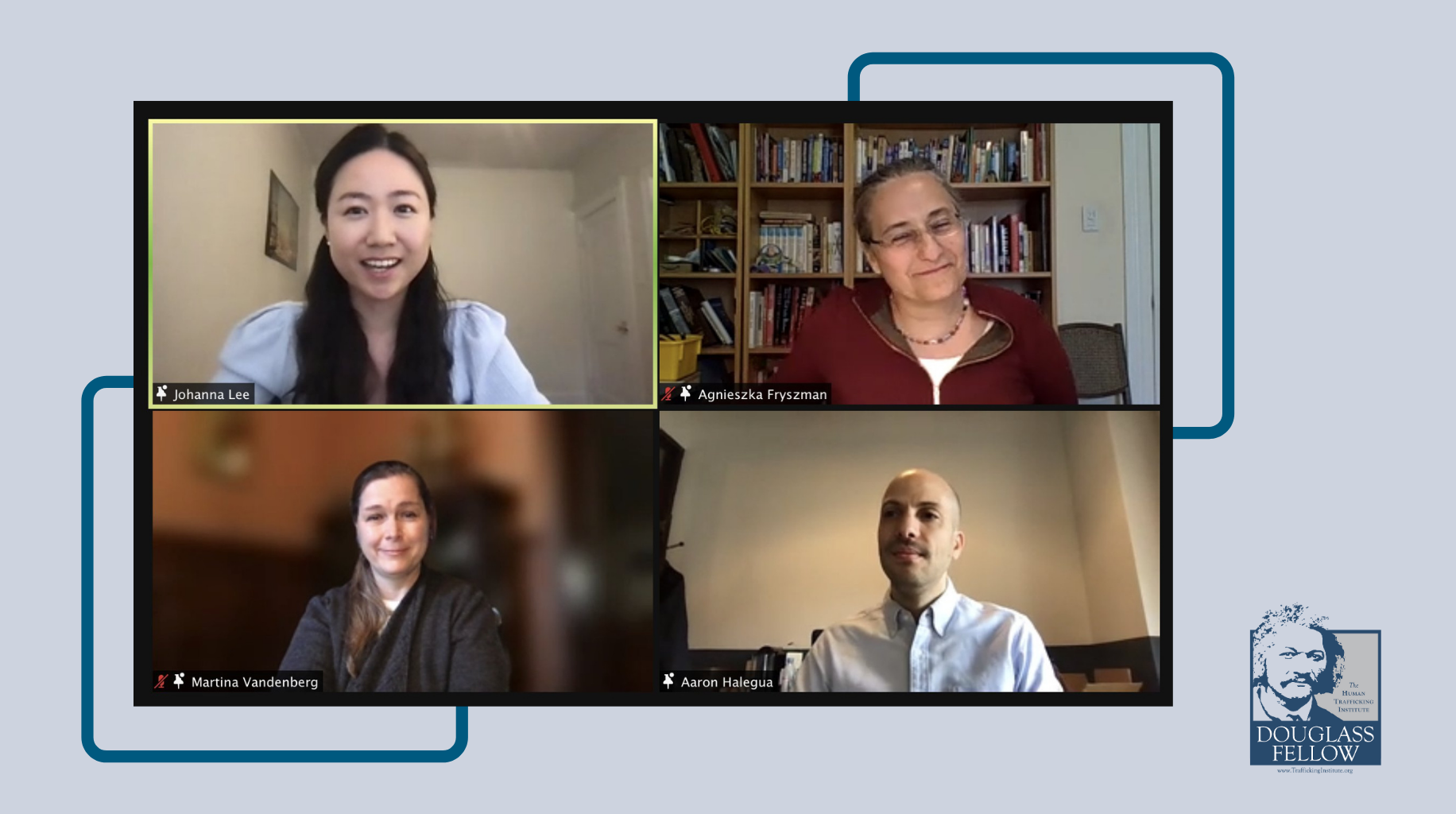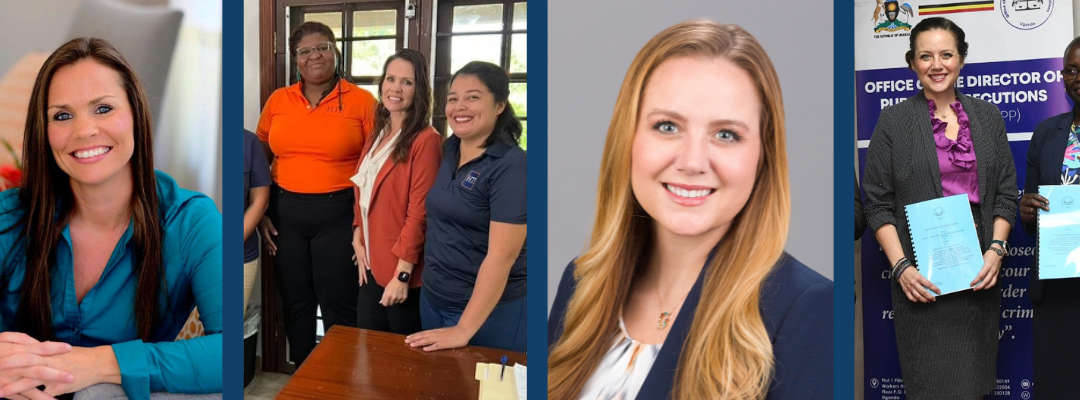Many are unaware that the products they use every day are produced with forced labor at some point in the supply chain, generating profit from exploitation for multinational corporations. Most goods produced by multinational corporations involve supply chains where components are produced by separate manufacturers or in multiple locations, providing various opportunities for exploitation that may go undetected or be ignored by the larger company. The International Labour Organization and Walk Free Foundation estimate that 16 million people worldwide are in forced labor conditions in the private economy—in industries like cocoa, cotton, mining, fishing, and construction.
On March 26, leading experts on forced labor and human trafficking gathered virtually for the panel “Civil Litigation as a Tool to Combat Forced Labor in Global Supply Chains” to discuss how civil litigation can help hold corporations accountable for forced labor in their supply chains. Co-sponsored by the Human Trafficking Institute and the Harvard Human Rights and Business Association, the event was organized by Douglass Fellow and third-year Harvard Law student Johanna Lee.
Each panelist brought a wealth of knowledge and experience, resulting in an engaging conversation for lawyers and non-lawyers alike:
- Agnieszka Fryszman, a partner at Cohen Milstein and Chair of the firm’s Human Rights practice, is recognized as the leader of one of the world’s best private international human rights practices. She regularly represents survivors of torture, human trafficking, and forced labor, prosecuting corporate giants.
- Aaron Halegua is a founding member of Aaron Halegua, PLLC and research fellow at both NYU Law School’s Center for Labor and Employment Law and the U.S.-Asian Law Institute. Halegua recently helped more than 2,400 Chinese survivors trafficked to Saipan for construction work to recover $14 million in compensation.
- Martina E. Vandenberg is the founder and president of The Human Trafficking Legal Center, which provides pro-bono counsel to survivors of trafficking. Vandenberg has more than two decades of experience combatting human trafficking, forced labor, rape as a war crime, and violence against women through litigation.
To begin the conversation, Vandenberg emphasized a major obstacle to corporate accountability: Criminal prosecutions have proved insufficient to address labor trafficking and exploitation.
The U.S. federal government only filed 9 forced labor cases in 2019, none of which were global supply chain cases prosecuting entities. In contrast, private litigators brought 63 civil forced labor cases against entities.
Halegua and Fryszman discussed civil cases they have worked on personally to provide examples such as the trafficking of Chinese migrant workers on a construction site in Saipan, Indonesian migrant workers on commercial fishing boats in the Pacific Ocean, and Cambodian migrant workers in a Thai seafood factory. These cases were brought under the U.S. Trafficking Victims Protection Act (TVPA), which allows for instances in which the crime occurred outside of U.S. jurisdiction to be heard in U.S. civil courts.
Despite the TVPA’s strengths, litigators bringing foreign forced labor cases under this law faced unique challenges, such as proving that perpetrators coerced their victims and had the requisite intent, as well as appearing before judges unfamiliar with the relatively new statute. Overall, the panelists seemed to advise a combination of courage, caution, and creativity in building cases using powerful tools like those added to the TVPA. Fryszman also recommended using foreign law in addition to the TVPA, Alien Torts Statute, and state law.
“It is important to be a little strategic when you have a new statute: To build up careful cases and not bite off more than you can chew, to not go right to the edge of the envelope and build bad law to start off with, and instead build a body of law that can be successfully applied. But you can’t know the twists and turns any case is going to go (through)…You can’t be paralyzed with indecision. Sometimes you just have to run forward,” Fryszman said.
Throughout the discussion, all three speakers highlighted the importance of civil litigation’s synergy with other efforts, such as policy reforms, direct legal services, and trade remedies. A combination of tactics in combating forced labor, they underscored, is the key to effectiveness.
“Corporations will never do this voluntarily, so civil litigation, criminal prosecution of corporations, and trade remedies have to work in tandem to actually get results,” Vandenberg said.
For lawyers and students hoping to enter the field, the panelists offered advice, stating that obtaining litigation experience, like taking depositions and making oral arguments, is more important than practicing in a particular setting. Whether in a legal organization or a law firm, professionals aiming to combat forced labor can work towards their goals by refining their craft, focusing on trauma-informed client interaction, interviewing, and investigation skills.
The conversation highlighted the need for change in the way the U.S. confronts forced labor, but also brought encouragement and advice for those hoping to contribute their skills to the movement against trafficking.
For Lee, this panel represented the culmination of the Douglass Fellowship, as well as an outpouring of her passion for anti-trafficking work.
Each Douglass Fellow at the Human Trafficking Institute creates a platform or organizes an event to engage key stakeholders in examining the intricacies of critical issues in the anti-trafficking movement. Lee’s experiences throughout law school with forced labor cases informed her choice to focus on corporate accountability in supply chains for her event.
During her 1L summer, Lee interned with the Cambodian NGO Legal Support for Children and Women addressing the issue of Cambodians being trafficked into the fishing industry overseas. During her 2L summer, Lee provided direct legal services to survivors of sex and labor trafficking in the Greater Los Angeles Area while interning with the NGO Coalition to Abolish Slavery and Trafficking. These internships confirmed her passion for combatting labor trafficking in an international context through advocacy and policy. As a Douglass Fellow, Lee conducted legal research on corporate accountability for forced labor in addition to conducting this advocacy event, allowing for a deeper dive into the subject.
“Interacting with these attorneys in the field has made me more excited about finishing law school and joining the ranks to come up with creative legal solutions to tackle the widespread problems of forced labor and corporate impunity,” Lee said.




